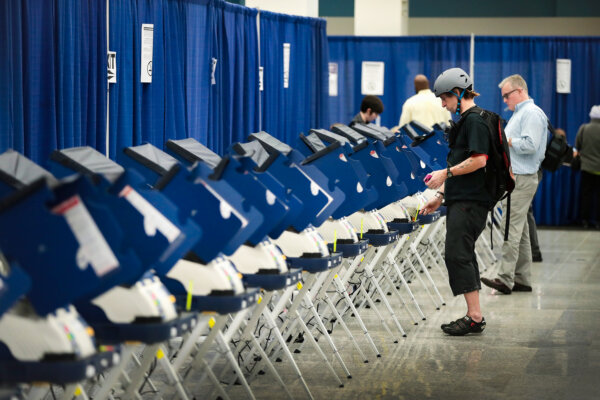
The judge found that the slating ban harmed prospective candidates by impermissibly burdening their right to have their names placed on the November ballot.
An Illinois judge has blocked enforcement of a controversial election law recently signed by Gov. J.B. Pritzker that barred political parties from appointing candidates to fill out general election ballots where the party did not field a primary candidate, a practice known as slating.
Judge Gail Noll granted a permanent injunction in an order on June 5 at the Seventh Judicial Circuit Court of Sangamon County, Illinois, blocking enforcement of the slating repeal for the current election cycle for plaintiffs in a lawsuit that challenged the slating repeal.
The judge noted that the repeal as it applied to a number of prospective candidates in the November general election was unconstitutional because it “impermissibly burdens their right to vote and to have their names placed on the November ballot.”
Last month, Democrats in the Illinois House added a last-minute amendment to Senate Bill 2412 called P.A. 103-0586 that changed state election laws, banning the slating appointment process that under previous rules was allowed within 75 days of the primary.
The move was sharply criticized by Republicans, a minority in the Illinois Legislature, who voted “present” and walked off the House floor without debating the measure. After it quickly passed both chambers, Mr. Pritzker signed it into law on May 3.
The new law meant candidates would be required to run in the March primary in order to appear on the November general election ballot.
Democrats framed the bill as an ethics measure that would prevent backroom dealing when choosing candidates, while Republicans said it unfairly changed the rules of a game that had already begun and amounted to election interference.
Republicans also objected because they said the law effectively gave Democrats a win in races in which GOP candidates weren’t slated in the primary.
The measure affected races in 78 districts that would not be contested in the November general election, according to the Illinois Policy Institute, a nonpartisan research organization.
The Lawsuit
The Liberty Justice Center sued the Illinois Board of Elections on May 10 on behalf of prospective GOP candidate Leslie Collazo, who said in a statement to the Illinois Policy Institute that she was unfairly harmed by the law because she had already started the petitioning process to get on the ballot.
“We had started the petitioning process, canvassing the neighborhood, collecting signatures,“ Ms. Collazo said. ”I had already started building out websites, investing in some technology that we could use to just get the word out. We were about halfway in as far as the number of petitions that we needed.
“Then with this bill, the rug got pulled out from under me. I was shocked.”
After reviewing Ms. Collazo’s petition, Judge Noll issued a preliminary injunction on May 23 that temporarily halted enforcement of the slating repeal.
More prospective GOP candidates joined the complaint on May 31, arguing that they were adversely affected by P.A. 103-058’s slating repeal and that it amounted to an “unconstitutional violation of their right to gain access to the ballot.”
Following a hearing, the judge ultimately sided with the plaintiffs, noting in her June 5 order that the law improperly interfered with ballot access.
“Plaintiffs have a clearly ascertainable right to be free from unconstitutional restriction on their right to vote which under the circumstances of this case includes their right to ballot access,” she wrote in the order.
Judge Noll’s ruling doesn’t void the slating repeal law entirely but blocks it only for this year’s general election for the plaintiffs.
Jeffrey Schwab, senior counsel at the Liberty Justice Center, praised the ruling.
“The General Assembly can change the rules for elections, but they can’t do it in the middle of the game to keep challengers off the ballot,“ he said in a statement. ”We are proud to stand up for these candidates and against yet another scheme to suppress competition in Illinois elections.”
Matt Dietrich, a spokesperson for the Illinois Board of Elections, told The Epoch Times in an emailed statement that the board would abide by any decisions of the court.
“The State Board of Elections was neutral in this lawsuit and will abide by the court order of June 5 and any subsequent, superseding court orders should other defendants appeal this decision,” Mr. Dietrich said.
Mr. Pritzker’s office did not respond to a request for comment. However, he defended signing the bill at a May 3 press conference in Bloomington.
“It really does make sure that we don’t have backroom deals to put people on the ballot and run as a result of some small group of people in a smoke-filled room making the choice,” Mr. Pritzker told reporters.
“So I think, to me, more transparency is better.”










